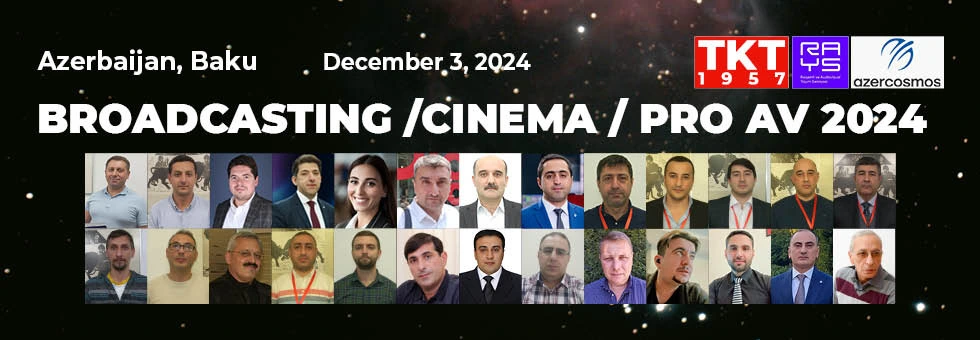Anar Ali Ogly Safarov, Deputy Director of the Technical Production Department at “Azerbaijan Television and Radio Broadcasting”, in the TKT1957 survey «The year 2030: AI or engineer?».
- How will the broadcasting industry and broadcast technologies change in the next 5 years?
- If we model the world of broadcasting and broadcast tech in 2030, what role will AI play?
- How will AI change your business segment?
- Which professions will AI displace in the broadcasting technology industry by 2030?
- Over the next five years, significant changes are expected in the broadcasting and broadcasting technology sectors. These changes will occur across various areas:
– Growth of Streaming Services: Streaming platforms will continue to gain popularity, attracting more viewers than traditional television. The number of streaming services will increase, with specialized platforms being developed for different types of content, such as sports, news, and entertainment. Over-the-top (OTT) services will expand, delivering content directly to users via the internet and becoming more widespread.
– 5G and Faster Internet: The deployment of 5G and faster internet will accelerate the streaming of high-quality content, particularly in 4K and 8K formats. As internet speeds increase, the quality of live streaming and user experience will significantly improve.
– AI-Based Content Recommendation Systems: AI-driven content recommendation systems will be more widely used on streaming platforms, enabling users to receive personalized content suggestions based on their interests.
– Virtual and Augmented Reality: These technologies will become more prevalent, offering interactive experiences, particularly in sports and entertainment. Personalized advertising technologies will also improve, making targeted ads based on user data more effective.
– Ad-Free Subscription Models: Subscription models without ads will grow in popularity and become one of the main revenue sources for streaming platforms.
- By 2030, artificial intelligence (AI) will play a pivotal role in the world of broadcasting and broadcast technologies. In this era, AI’s role will extend far beyond content creation and distribution, transforming the entire broadcasting ecosystem into a more intelligent and interactive environment.
AI will be widely utilized in scriptwriting, video editing, and even in the creation of entirely new movies and TV series. AI-driven algorithms will automate the content creation process, enabling the production of high-quality content with minimal human intervention.
There will be the ability to dynamically alter or customize content to suit individual user preferences. For example, different viewers could watch the same movie with varying endings based on their choices or preferences.
AI will deeply analyze viewing habits, providing tailored recommendations that go beyond simple content suggestions to influence how content is presented (e.g., changing the user interface or displaying specific ads).
AI will also be capable of altering content in real time by analyzing viewers’ emotional reactions (such as facial expressions or tone of voice) to deliver a more emotionally engaging experience.
By 2030, virtual and augmented reality will further enhance AI technologies, allowing users to immerse themselves in entirely different worlds. Immersive content will be more accessible to a broader audience and will be individually tailored.
Combating piracy and protecting content rights will be managed by AI, helping to prevent unauthorized use of content.
AI will be used to analyze and manage content on social media and other broadcasting platforms, helping to detect fake information, prevent hate speech, and ensure adherence to ethical standards.
In 2030, AI will be integrated into every aspect of the broadcasting industry, radically transforming both broadcasting technologies and the consumer experience. With the advancement of these technologies, the streaming process will become more intelligent, personalized, and user-centric.
- Artificial intelligence (AI) will significantly transform the business segment, elevating company operations, decision-making processes, and customer interactions to new levels. The impact of AI in the business sector will be felt across various areas:
- Automation of Repetitive Tasks: AI technologies will automate repetitive and labor-intensive tasks, leading to significant time savings and increased efficiency in areas such as accounting, human resources, and customer service.
- Process Optimization: AI will be used to streamline and optimize workflows, reducing delays in production chains, logistics, and supply chain management. This will lead to more efficient operations across the board.
- Data-Driven Insights: AI will process large volumes of data (big data) to identify trends and patterns, providing companies with the critical information needed for strategic decision-making. For example, sales forecasting, market demand analysis, and risk management processes will become more accurate and faster.
- Enhanced Decision-Making: AI algorithms will assist business leaders in making decisions, not only speeding up data-driven decision-making but also enabling more precise and risk-averse choices.
- Customer Support: Automated systems powered by AI will handle customer support, with virtual assistants responding to customer inquiries in real-time. This will improve customer satisfaction and reduce support costs, while offering personalized product and service recommendations. AI will be widely used to personalize the customer experience across various sectors, from e-commerce platforms to banking services.
Overall, the integration of AI will enhance efficiency, drive innovation, and provide competitive advantages in the business segment, making operations more flexible and customer-centric. While AI will create new opportunities for businesses, it will also pose new challenges, particularly in ensuring the ethical and responsible use of these technologies.
- By 2030, artificial intelligence (AI) is likely to replace several professions within the broadcast technology industry, particularly those that are susceptible to automation, repetitive tasks, and data-driven processes. However, some roles will not disappear entirely but will instead evolve and transform.
- Video and Audio Editing: AI can automate video and audio editing tasks, such as automatic clip selection, editing, sound optimization, and image enhancement. This may reduce the need for professional editors, as basic editing can be performed by AI algorithms.
- Scriptwriting and Content Generation: AI algorithms can automatically generate simple scripts or content. Commercials, short clips, and even some episodes of movies and TV shows could be written by AI. This might reduce or replace the role of scriptwriters, as they shift to editing and refining AI-generated content.
- Customer Support and Technical Assistance: AI-powered chatbots and virtual assistants will be used for customer support and technical assistance, providing an efficient way to solve user problems and offer information. This will significantly reduce the number of staff required in these areas.
- Automated Camera and Drone Operations: AI-controlled cameras and drones will be able to operate more independently. In live events such as sports, news, and other broadcasts, systems that automatically choose the right angles, track movement, and focus on the correct shots could replace traditional camera operators.
- Social Media Management: AI tools will become widespread in managing social media. Content planning, automated posting, trend analysis, and user interaction management will be handled by AI, which could substantially alter or reduce the role of social media managers.
- Automated News Creation: AI could enable the automatic creation of certain types of news. For example, AI can generate and broadcast news on topics like sports results, financial reports, or weather forecasts. While this might not entirely eliminate journalists, it could change certain aspects of their work.
The development of AI will accelerate the natural evolution of professions in the broadcast technology industry, but this process will not lead to the complete disappearance of jobs. Human abilities in creative and strategic thinking will remain invaluable, leading to new employment opportunities and professions in collaboration with AI.











